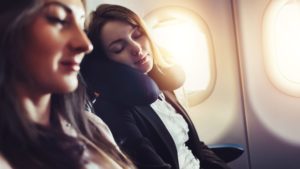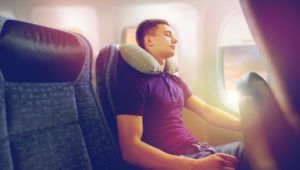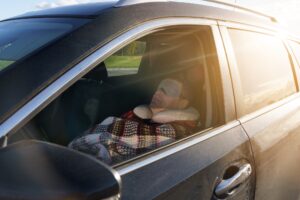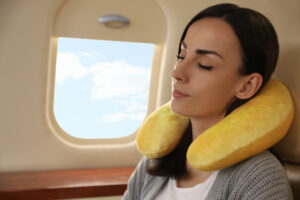When you buy through our links, we may earn a commission. Products or services may be offered by an affiliated entity. Learn more.
Sleeping in a Tent: Tips and Gear for Comfort
Embarking on a camping trip offers the chance to reconnect with nature. At the same time, the excitement of travel, new surroundings, and unfamiliar noises can make it difficult for some people to sleep once they zip up their tent for the night.
How to Sleep Comfortably in a Tent
While some people find it easy to doze off while lying under the stars, others find it challenging to sleep in a tent. For those who have trouble getting enough rest on camping trips, sleeping well often boils down to preparation, the right equipment, and a few key practices.
Pack For Comfort
Prepare for a night in the wild by packing the right clothing. Find clothes that are breathable and comfortable to sleep in, like moisture-wicking layers, a cozy hat, and warm socks. Also, set aside specific items just for sleeping to keep them clean and dry.
Choose The Right Spot
Finding the right camping spot can make sleeping in a tent more comfortable. Choose a spot that is large enough to fit the tent, with a little extra space for easy entry and exit. Avoid spots with excessive roots or rocks and steer clear of areas where water might accumulate if it rains.
Allow Time for Relaxation
Before getting into the tent at bedtime, set aside some time to wind down. Choose a relaxing activity, like reading a book by a lantern’s light, practicing a few minutes of deep breathing, or listening to soft music on a pair of headphones.
Find The Right Temperature
People tend to sleep best around 65 to 68 degrees Fahrenheit, so it is important to pack the right sleeping bag. A sleeping bag should be tailored for the season to ensure warmth without overheating. During colder nights, adding thick socks or a beanie can help regulate body temperature. If it’s warm out, venting the sleeping bag or using only a sleeping bag liner can offer a cooler alternative.
Create Ambient Noise
The sounds of nature can be soothing, but unfamiliar sounds can also disrupt sleep while traveling. Consider a battery-powered white noise machine or smartphone app to maintain a consistent and relaxing soundscape.
What to Sleep on When Camping
The choice of sleeping surface plays a pivotal role in ensuring a restful night. From sleeping pads to elevated cots, selecting the right gear can help campers have a more restful and restorative night under the stars.
Sleeping Pads
A sleeping pad provides insulation and cushioning. Consider the pad’s size and weight, as well as the terrain, expected temperatures, and personal preferences when choosing between options like self-inflating pads, foam pads, and air pads.
Air Mattresses
Car campers may prefer an inflatable mattress that offers the feel of sleeping in their own bed. Ensure air mattresses are puncture-resistant and tall enough to avoid bottoming out during the night. Also, consider whether the air mattress provides insulation against the cold ground.
Cots
Cots are designed to be lightweight and portable. While a cot may be bulkier than a rolled up sleeping pad, the added height makes it easy to get into and out of bed while ensuring that bedding remains dry if water seeps into the tent.
Pillows
Pillows can help to ensure that the neck and spine are aligned. Some campers like inflatable or compressible camping pillows, while others prefer to simply roll up a jacket or stuff sack.
How to Sleep in a Tent With CPAP
For people with obstructive sleep apnea prescribed CPAP therapy, it is important to use the machine every night. Traveling with a CPAP machine takes some extra effort, but finding the right device and accessories can make it easier to use a CPAP machine while sleeping in a tent.
- Travel-friendly machine: Many CPAP machines are too bulky to use while camping. Fortunately, travel CPAP machines are designed for portability and contain added features for travel.
- Portable power supplies: Standard CPAP machines typically rely on electrical outlets. When an electrical outlet is unavailable, a portable CPAP battery becomes an essential piece of equipment.
- Lightweight and durable accessories: Not all CPAP accessories are created equal. Avid campers may find it helpful to stock the right accessories, like a travel case, a low-profile mask, and flexible tubing.
To ensure a smooth camping trip, be sure to set up the CPAP machine before it gets too dark outside. Finally, be sure to protect the device from the elements by placing it in a warm and safe spot within the tent.

Still have questions? Ask our community!
Join our Sleep Care Community — a trusted hub of sleep health professionals, product specialists, and people just like you. Whether you need expert sleep advice for your insomnia or you’re searching for the perfect mattress, we’ve got you covered. Get personalized guidance from the experts who know sleep best.
References
2 Sources
-
Carudo, C. & Chosewood, C. (2020, June 29). Improve sleep: tips to improve your sleep when times are tough. NIOSH Science Blog. Centers for Disease Control and Prevention., Retrieved November 1, 2023, from
https://blogs.cdc.gov/niosh-science-blog/2020/06/29/sleep-hwd/ -
Liu, S. F., Lee, Y. L., & Liang, J. C. (2011). Shape design of an optimal comfortable pillow based on the analytic hierarchy process method. Journal of chiropractic medicine, 10(4), 229–239.
https://pubmed.ncbi.nlm.nih.gov/22654680/









